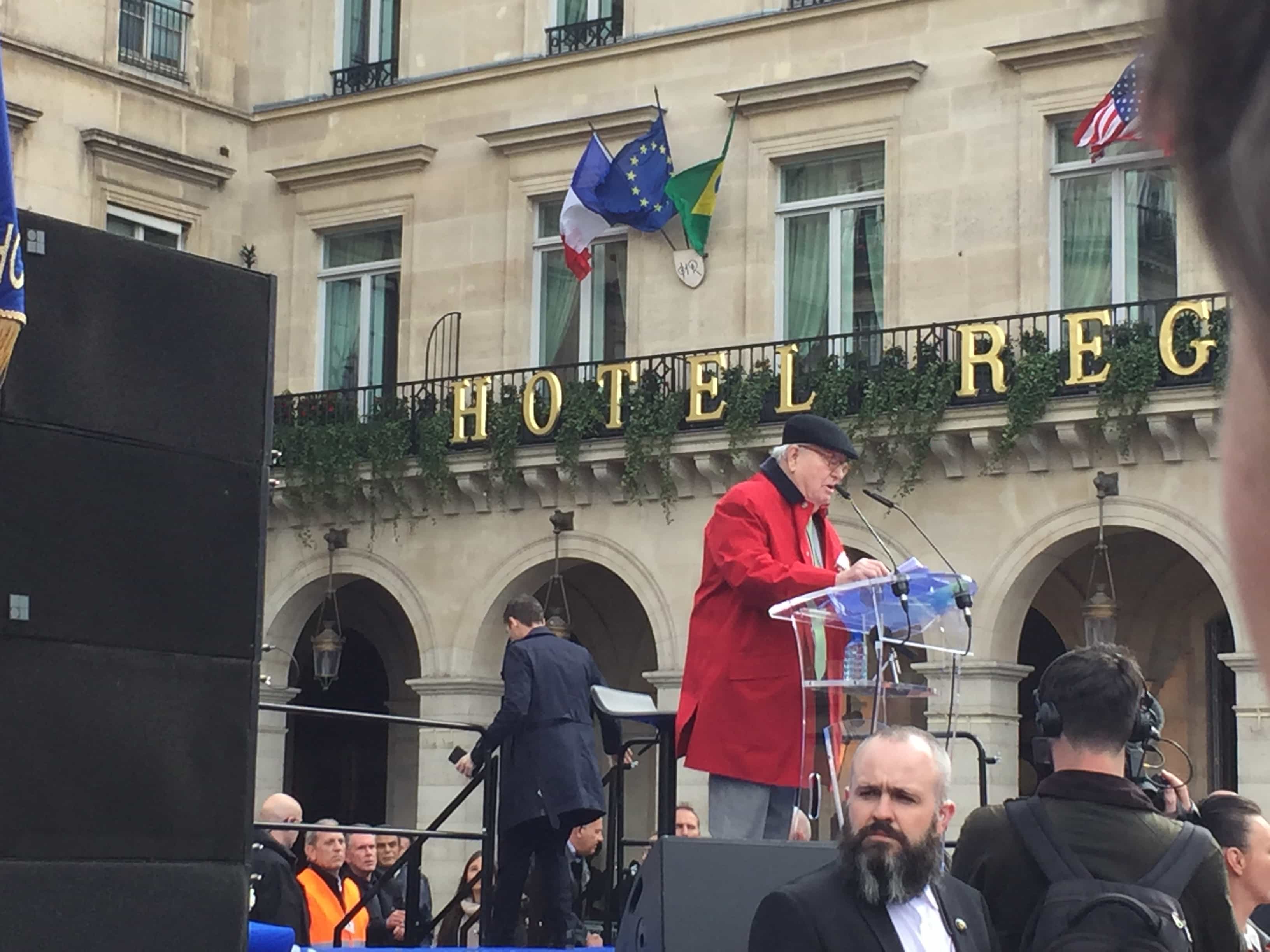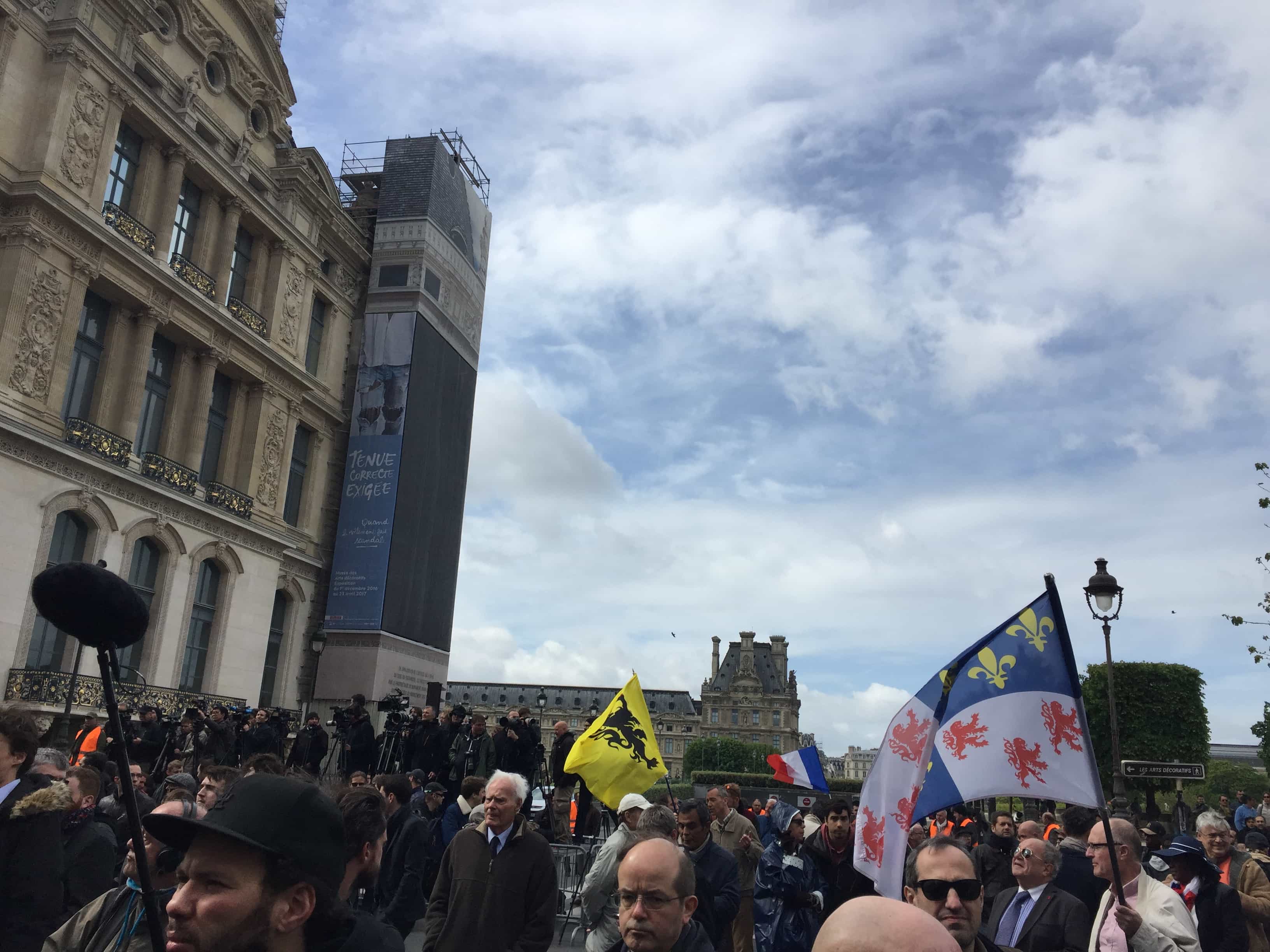By Jimmy Quinn
On Monday a thundering column of parading far-right nationalists converged at Paris’ Place des Pyramides to join far-right legend Jean-Marie Le Pen for an annual May Day Joan of Arc celebration.
The elder Le Pen appeared without his daughter and National Front presidential candidate Marine Le Pen, who was assembling her own supporters beyond Paris’ city center in the suburb of Villepinte. Following his expulsion from the party for oft-repeated comments minimizing Nazi concentration camp gas chambers as a “detail of history,” they rarely appear in public with one another.
The symbols of national power were overpowering. The demonstrators marched past the Conseil d’État and the Louvre, and the far-right patriarch spoke in front of a golden statue of Joan of Arc. On this particular May 1st, between the two rounds of a historic presidential election that has put nationalist agitation at the fulcrum of French politics again, the address held a poignant significance that helps us understand France’s far-right movement.
Hobbled by old age and looking strained, Le Pen sat on a stool before his podium and delivered a speech of the sort that won him notoriety among his political allies and adversaries alike. The central themes of his perennial message animated his comments: Anti-elitism, anti-immigrant posturing, and economic populism. Whereas the French voting public has grown used to a nationalist political discourse that emphasizes the problems of globalization and political elites, Jean-Marie Le Pen gave the crowd a taste of his riskier brand of identitarian far-right politics.
While his declarations were consistent with some of his daughter’s policy proposals, like those to leave NATO integrated command (this line got a lot of applause), boost defense spending, and eliminate jus soli, he also highlighted where the new, less-objectionable National Front has departed from its ideological roots. His daughter’s party has tried to move past the historical controversies and divisive social issues that only play well with voters in its southern base, but on Monday the founder of the movement called for the repeal of laws legalizing gay marriage and criminalizing the denial of certain historical atrocities like the Holocaust.

Jean-Marie Le Pen speaks to supporters in Paris on May 1st.
Jean-Marie Le Pen is politically toxic, yet the younger Le Pen’s party is still very much that of her father’s. While she has spent the past six years purging it of its anti-Semitic, openly racist, and authoritarian elements, this process of dédiabolisation (roughly translated to mainstream-izing) is a difficult one that often seems to miss the mark. As recently as last week the interim president of the National Front stepped down amidst criticism of his comments that the Nazi regime did not use Zyklon B gas to kill Jewish concentration camp prisoners.
Many of those assembled to watch Le Pen speak by the Tuileries would next go on to Villepinte to hear from his daughter. They did not seem to think they had to make a choice between the Le Pens, since they represent the same political project. While they had come to celebrate the founder of their political movement, they were also eager supporters of Marine Le Pen’s candidacy. One woman told me, “I’m a supporter of the family,” as if to say the younger Le Pen isn’t perfect but acceptable enough. This is a sentiment that Le Pen echoed in his speech to the effect that Marine Le Pen is no Joan of Arc, but she carries the same political goals. There were also committed supporters of the daughter present, however. When I asked a man sitting in a café after the speech if he was going to see her speak he unfurled a Marine présidente banner with an enthusiastic, “Ouiiiiiiiiii!“
There was little concern about the divide between the factions of the party led by the socially progressive Florian Philippot and the traditionally conservative Marion-Maréchal Le Pen. Michel, a Parisian Front supporter I spoke with, noted that the two figures had different perspectives on social issues, but that this was a secondary consideration to saving the country. Fixing the economy and preventing France from “disappearing” came first in his estimation. I think most Frontists share the same view. For many, the patriotism that the Le Pens incarnate is an aspect of identity to rally around, not thinly-veiled xenophobia.
Patriotism was the word of the day. Emmanuel Macron, still leading the in the polls, has invoked this term recently, on which his second round adversary previously held a monopoly. A favorite line of hers is to characterize the fight for France’s political heart as a battle between patriots and globalists. He struck back during his first round victory speech by naming himself the champion of patriots against the nationalists.
Needless to say, the nationalists don’t take kindly to this play on words. It lends nationalism a malicious meaning and casts the so-called candidate of elitism, international finance, and Francois Hollande as a patriot. Le Pen himself rebutted this connotation with an attack on Macron’s career path, “But no, Mr. System…”
Macron the charismatic cosmopolitan represents a unique threat to the far-right’s project. He’s distinct in having mobilized a broad-based movement that celebrates European integration, perhaps the first politician on the continent to do so with such success. But the threat he poses is one that gives Marine Le Pen the opportunity to make a clear contrast that would have otherwise been difficult to draw on economic issues against a left-wing opponent and on societal questions against the right-wing Francois Fillon. Globalization is her party’s central issue, and she stands to benefit from the new focus on it.
In France’s new politics there are two poles, one of modern society’s globalized consensus and the other of nostalgia for a France that has never actually existed. They both represent the other’s worst nightmare and a poorly drawn caricature of the truth. Macron’s France is out of touch, disdainful of the average Frenchman, and submissive to an authoritarian European technocracy. Le Pen’s France is illiberal, xenophobic and anti-Semitic, and prone to self-inflicted penury. There is no equivocation or middle ground. They inhabit different public spheres and largely speak the language of different cultures.
Both sides misunderstand each other. They’ve each fallen victim to the misinformation they accuse each other of spreading. Mistrust of the media ensues. A far-right blogger handed me a slip of paper advertising her site after the speech: “ENOUGH OF THE PRESS’S LIES! WE SHOULD ALL BECOME JOURNALISTS.” Michel says that his friends are voting for Macron as a “Pavlovian reflex” to forty years of propaganda falsely linking the National Front to Nazism. The party faithful think their beliefs are misunderstood and distorted by those in power. This contributes to the pervasive sense of victimhood at the core of the National Front’s essence, and it meshes with the broader societal angsts that have made the Front’s message so successful.
On Monday the extreme-right types were out in full force, and royalist flags fluttered above the crowd. An activist distributed flyers entitled “ourselves before the others,” encouraging social assistance measures for citizens of France and an end to the preferential treatment of foreigners. I saw him again soon, but this time in a video on my Facebook newsfeed deploying a racial slur against a reporter from the French commentary program Quotidien.
There is clearly still an active dark underbelly to the party. In any case, though, it has become an outlet for individuals looking for a sense of belonging and a deeper attachment to the French nation. I watched the speech next to a student at Paris’ prestigious HEC business school. Smartly dressed and attempting to speak with me in impressive English, he didn’t fit the populist-nationalist mold. In many respects the National Front has entered the mainstream; the political preferences of thirty to forty percent of the French electorate cannot be explained away by racial unease. The polling tells us what we already know – that Marine Le Pen’s attempts to craft a less-objectionable political narrative are finding success and bringing new supporters into the fold.

Marchers gather at Place des Pyramides for an annual celebration of Joan of Arc.
But this is where the National Front will meet its greatest challenge over the coming years. How can it be palatable to the broader voting public without totally expelling the extremist activists that constitute one of its foundational pillars? The Front was founded in 1972 as the radical right searched for non-violent, alternative means through which to pursue its agenda, but as much as it abandoned its overtly anti-democratic sentiments, there’s still enough controversy within its ranks to repel voters. Some potential National Front supporters were likely repelled by Le Pen’s zealously negative performance during Thursday night’s debate. Voters also won’t ignore the party’s flirtation with historical revisionism of the sort she invoked to minimize the role of the French state in the World War II era Vel d’Hiv deportations and for which her father is widely reviled.
Between the extremes, the traditionalists, and the typical French voter there’s simply too much distance. The Front will eventually have to choose between pursuing its current trajectory towards moderation to its logical conclusion, becoming an anti-globalization party purged of historical and racial controversy (easier said than done, clearly) and remaining a reflection of its founder’s odious politics. Pursuing the former path wins votes but deprives the Front of the demagogic panache that has endeared it to some; pursuing the latter is a surefire way to stay trapped on the fringes of French politics.
Jean-Marie Le Pen’s continued influence in far-right circles reminds us that while there are fundamental stylistic and substantive differences within the National Front, there is still a notable degree of unity behind its overarching nationalist project. In the near term Marine Le Pen will keep the base together and expand it just enough to spook the political class as she’s done for the previous six years. After Sunday evening, though, the National Front faces a clear choice as to the kind of party it will have to be in order to eventually govern. Between the mainstream and the extremes there might be no winning trade off.


